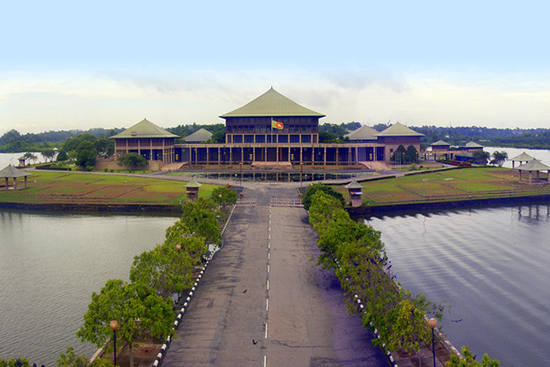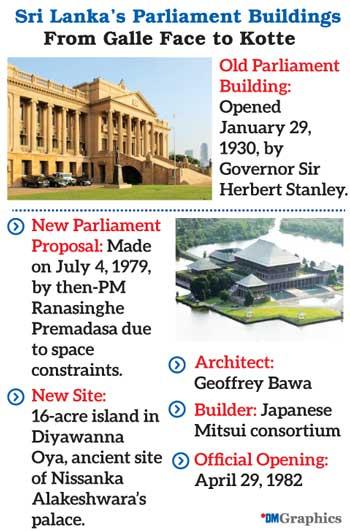

The Urban Development Authority has declared the Parliament Complex building to be a dilapidated and dangerous structureÂ


The old Parliament building, located at Galle Face in Colombo and facing the ocean, was officially opened on January 29, 1930 by the then-Governor, Sir Herbert Stanley. Due to the limited space within the old Parliament building and the lack of available land for expansion, then-Prime Minister Ranasinghe Premadasa presented a proposal to Parliament in the late 1970s, specifically on July 4, 1979, to relocate Parliament to a new location.


It was decided to construct a new Parliament in Sri Jayewardenepura Kotte. The site selected was a small 16-acre island which was a wetland in the Diyawanna Oya, which once belonged to the Kingdom of Sri Jayewardenepura Kotte.
The new Parliament was built on the site of the palace of Nissanka Alakeshwara, a powerful prime minister who served under King Vikramabahu III, in the city of Sri Jayewardenepura Kotte.
At the time, the Japanese Government agreed to provide financial assistance for the construction of the new Parliament building. Geoffrey Bawa, a Sri Lankan architect who had worked with Edwards Reed and Beg, was selected as the architect, and a Japanese consortium of two Mitsui Companies was tasked with building the new complex.
Construction was completed, and the new Parliament building was officially opened on April 29, 1982.
Several prominent Sri Lankan artists and sculptors were commissioned to create artworks and statues to be displayed in the new Parliament building.
Thus, the country’s legislature moved to the new parliament in Sri Jayewardenepura Kotte.Â
Since April 29, 1982, this Parliament has provided shelter to the legislature of Sri Lanka.Â
From 1982 to the present day, although substantial funds have been allocated for national development and various projects, very little has been directed towards the renovation of the Parliament complex. Despite 43 years having passed since its construction, no major renovation work has been carried out, and the building has now been declared dilapidated.
What the inspection report revealsÂ
According to a condition inspection report conducted in recent years, the Urban Development Authority has declared the Parliament Complex building to be a dilapidated and dangerous structure.
A proposal has been made to urgently repair the Parliament Complex due to rainwater leaking from the roof; the leak has caused several cracks in the walls and pillars. A construction assessment report, prepared last year, also indicates that the Parliament building has deteriorated due to issues connected to outdated electrical system, old equipment and a deteriorating water pipe system. As a result, the Urban Development Authority has provided an assessment report stating that urgent repairs are necessary. A rough estimate has been submitted, indicating that the renovation would cost Rs. 10 billion, according to the Speaker’s Office.
The Speaker’s Office further mentioned that Rs. 5 billion of this estimate is expected to be used solely for repairing the roof, which has sustained significant damage to its ceiling structure due to leaks in the roof of the complex.
The construction assessment report highlights that the gutter system inside the Parliament Complex has significantly deteriorated and needs replacement. Since the system is made of copper, the estimate states that a major portion of the renovation budget will be required for this replacement.Â
Additionally, the Urban Development Authority’s estimate report emphasises that the outdated electrical, plumbing, technical, and toilet systems must be completely renovated. It is proposed that all these systems be reinstalled in a way that preserves the original architectural design of the Parliament building. This will be done with the involvement of multiple parties. The Urban Development Authority has also stressed, through the assessment report that the renovation should be carried out to meet modern standards.
Accordingly, renovation work is planned to commence this May and will continue during a five-year period. The Urban Development Authority has informed the Parliament’s Technical Committee that, due to the need to keep Parliament operational, renovation activities will be conducted in stages without closing the building entirely.
Although considerations were made during previous discussions to hand over the engineering work to the Central Engineering Consultancy Bureau, a state institution, no final decision has yet been made, according to the Urban Development Authority.
| Geoffrey Bawa, a Sri Lankan architect, was selected as the architect to design the parliament building |
The Speaker’s Office also stated that the Sri Lanka Army and Navy have already agreed to provide labour support for the roof renovation.
Initially, USAID and MAX PLAN, a non-governmental organization, had agreed to provide financial assistance for the renovation. However, due to the recent suspension of USAID funding to Sri Lanka by the US President, there is currently no financial support available for the project this year. Consequently, the Speaker’s Office has reported difficulties in moving forward with urgent renovation work.Â
It is also reported that, due to concerns regarding the large expenditure involved, Speaker Dr. Jagath Wickramaratne has instructed the relevant parties to conduct a thorough review of the proposed costs before proceeding.Â
Aravinda Kalugaldeniya, Head of the Planning Division of the Central Engineering Consultancy Bureau, said that although the typical lifespan of a building is around 50 years, the 43-year-old Parliament building has already reached a dilapidated condition, and he has informed the Parliament’s Technical Committee that it requires immediate renovation. He added that while minor repairs are carried out on a daily basis, this is the first time a major renovation is being proposed. He also mentioned that a detailed construction assessment has not yet been completed for the Parliament building; meaning a final decision has not been made regarding exactly which parts require renovation. It is assumed that in some areas, outdated technical and electrical systems will need to be replaced. Despite several rounds of discussions between the relevant parties since last year, no formal agreement has yet been reached with the Central Engineering Consultancy Bureau. However, Kalugaldeniya emphasised that given the building’s architectural design, the Parliament building could be preserved for a long time following proper renovation.
Project Director of the Urban Development Authority, Thushari Thilakarathna, maintained that the roof, toilet system, library, security booths, electrical system, water pipe system, and staff rest areas of the Parliament urgently require renovation.
As it is not feasible to close Parliament to carry out the work, the renovation will be conducted in stages.
Based on the financial allocation made by Parliament, it has been planned to carry out the renovation work over a five-year period, with completion targeted by 2030. A detailed report has already been submitted to the Parliament’s Technical Committee.
Although the current estimated cost for the renovations stands at Rs. 10 billion, Thilakarathna pointed out that the involvement of the Sri Lanka Army and Navy in providing labour could help significantly reduce the overall cost.
It is planned to call for open tenders for the renovation of certain parts of the building. Tenders are being prepared for the third time for the replacement of the Parliament’s roof gutter system.
It is planned to remove the outdated technical systems in the Parliament building and install a new, modern system suitable for current needs. However, given the significant costs involved, the Parliament’s Technical Committee has decided that the renovation work will be carried out section by section, using only the funds allocated for this year.
Thushari Thilakarathna said that this will be the first major renovation project undertaken since the construction of the Parliament in 1982.
The renovation is scheduled to be carried out under the supervision of the Geoffrey Bawa Trust, the original architect of the Parliament building.Â
The renovation of the Parliament complex must commence this year.
Thilakaratne further stated that the Urban Development Authority will also charge a specified fee from Parliament for the planning of the construction work.
Reports indicate that the Parliament is currently facing a financial crisis due to inadequate budget allocations for this year’s renovation activities, along with the withdrawal of financial support from international organizations such as USAID.
The Speaker’s Office announced that the government has decided to audit the expenses incurred by two governments over the past ten years due to concerns about a lack of transparency.Â
The Auditor General has already been instructed to prepare an urgent audit report on the matter.
This decision was made because Speaker expressed dissatisfaction over questionable expenditures during the terms of the 8th and 9th Parliaments.
It was revealed that during that period, financial audits were handled by private institutions, raising concerns about transparency.
As a result, the Speaker’s Office stated that Speaker Dr. Jagath Wickramaratne is now taking active steps to cut all unnecessary expenses within Parliament.
Sri Lanka’s rich culinary and cultural heritage has received global recognition as several locally popular…
Airbus has spotlighted Meriesha Fonseka, a talented Sri Lankan engineer, as part of their single-aisle…
Former Secretary to the Health Ministry Janaka Chandragupta, who arrived at the Commission to Investigate…
The Colombo High Court yesterday sentenced a retired land officer to 22 years of rigorous…
Hundreds of vehicles are stranded at the port, with hundreds more on the way, after…
The Starlink satellite internet service will be made available to local customers following a one-week…